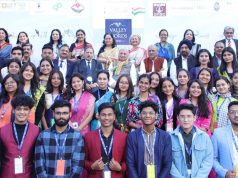Zubeen Garg (18 Nov 1972 – 19 Sep 2025)
 By Shahnaab Alam
By Shahnaab Alam
Despite my friend Satish Sharma requesting me to write a tribute to the beloved legend, Zubeen Garg, my grieving heart couldn’t express anything cohesive. I waited for another day to process the news of his final departure, as did the countless mass of people across the North-East. People from the region have not slept since the shocking news of his tragic demise in Singapore broke out, rather, the grieving masses spontaneously shut-down their lives and poured onto the streets. About six years ago, he instructed his audiences across the state that once he dies the entire Assam has to sing ‘Mayabini Ratir Bukut’ (in the bosom of a magical night…) one of his most profoundly soulful songs. 
And ever since the tragic news, people from all across the state have emerged to collectively sing this song non-stop on the streets, in front of closed shops and markets, in neighbourhood corners, in schools, colleges and universities, and even the CM joined the chorus of on-duty personnel singing this song at the tarmac of Delhi airport, when they raised the coffin containing Zubeen’s mortal remains for its flight to Assam. At the Guwahati airport, the entire staff of duty personnel, breaking protocol, rushed towards the aircraft carrying his mortal remains, sobbing uncontrollably. When the ambulance carrying him made its way to towards the city, an ocean of humanity followed the entire route. The rally accompanying Zubeen Garg on his final journey is probably second only to those of Michael Jackson, Pope Francis and Queen Elizabeth II. The country has never witnessed a public outpouring such as this. Such is the pain everyone is experiencing, that the state government had to postpone his final rites by another day and extend the official mourning period, just so that thousands of buses and vehicles carrying heartbroken fans from all across the region can reach Guwahati for a last glimpse of their beloved son and brother. After all, he genuinely belonged to each and every family. People have been breaking down and collapsing at the sight of their heart throb in a lifeless state. Assam referred to him not as a singer, but rather, as an emotion. How do I begin to explain a socio-cultural icon, who is the very heartbeat of Assam, the living thread that binds the North-East, the superstar who used his music and artistry to heal, strengthen, unite and provide an identity to a land fractured through years of unrest. At the end of 1980s when the whole region of Assam and the North-East was struggling to emerge from decades of conflict that had left everything, including artistic expressions, in tatters, Zubeen Garg breezed into the hearts of an entire populace, applying a healing touch with his first album of Assamese songs, ‘Anamika’ in 1992. Ever since, and over the years, that breeze turned into a storm, and Zubeen Da became everyone’s hope, identity and support. For this outspoken artist the usual convention was to fearlessly challenge and tear through stifling social norms, outdated religious dogma, and unsettling political authority. He was the check on the administration on behalf of the masses. With his inspirations ranging from Bishnu Prasad Rava and Che Guevara, he sincerely believed that art has to uplift society, and music has to voice what the masses feel. He had famously declared that he has no caste, creed or religion, he was just a human, and as an Assamese he belongs to all tribes and communities. Unlike usual superstars, he moved and mingled with the masses as one of their own, without much of an entourage. His magic was the raw honesty and gentle humility, which never changed despite all the fame and popularity he was bestowed with. Music was his tool, and he remained a rebel with a cause.
I have been very fortunate to have very closely witnessed the making of this legend. I was introduced to Zubeen, a long-haired youth filled with music, within the initial years of his arrival in Mumbai, by another fellow Assamese, Kalyan Barua ‘Kelly’, the renowned Guitarist. Zubeen arrived in Mumbai to work his magic in the national music and film industries, while we both attempted to add some advantages by introducing him as widely as possible, not that it was required. At the time I was associated with YashRaj Films as the Executive Producer, and working very closely with Music Director, Prittam Chakraborty. Prittam was very quick to recognise the brilliance of Zubeen, and very soon Zubeen rendered the iconic chart-buster song ‘Ya Ali’. This was followed with several other well-known Hindi Film songs, firmly positioning him as a lead singer. Meanwhile, I proudly watched his success from a distance and celebrated his rapid rise through the ranks. It would not be wrong to say that Zubeen’s journey from being a background talent working in the studios with the likes of Ranjit Barot, to becoming a lead singer, opened the floodgates and inspired scores of Assamese and North-Eastern talents to follow his path, and swamp the mainstream Music and Sound industry. Meanwhile, even though he tasted immense success, he was increasingly disillusioned with the repetitive stereotyping of his voice in Mumbai, and his success couldn’t stop the yearning for his homeland. Frustrated with the lack of artistic growth, he soon left the Mumbai music industry high and dry, to immerse himself completely in Assam, amongst its culture, people and music. Over the next decades he explored the limits of his incredible range, by creating a new contemporary soundscape, by reimagining traditional folk music, and rendering the classics of the earlier maestros, all with his ever-melodious voice. Known for recording a couple of songs almost every day, he has almost 40,000 released and unreleased songs in 40 languages to his credit, and this massive collection of songs is the musical saga of one of the greatest phenomena ever.
Assam’s biggest festival, Bihu became Zubeen’s stage. Looking forward to Bihu in Assam also meant waiting for Zubeen’s new Bihu album. With such a huge cache of songs, he touched the souls of millions. So much that now during any social or celebratory occasion, within homes or in public gatherings, Hindi and English songs have been replaced by Zubeen songs. He created a definitive playlist for the coming generations in the region. The generations born before him and at the same time as Zubeen, were the ones scarred by conflict, for whom he became the son or brother who provided self-respect and identity. And the generations born since 1990, who have spread their wings to explore opportunities around the globe, have been carrying with them three things that help maintain their connection with their homeland, Bhoot Jolokia (officially the hottest chilli in the world), Kazi Nemu (the GI tagged large green oval-shaped, highly aromatic lemon from Assam), and most importantly, Zubeen Da’s music. Zubeen was such a force of nature that he almost single-handedly resurrected the music and film industry of Assam, post conflict years. Since his very first album till his last work, the level of creative brilliance remained the same with an unbelievable supply of continuous superhit songs. He was a cultural insurgent who fiercely championed local languages and sounds through his music and became a force of resistance against the wave of commercial Hindi music which threatened to drown regional voices. His songs gave people pride and joy in their native languages and culture in an increasing standardisation of global music. Similarly, the Assamese film industry was in a really bad shape for a long time, with resources drying up and most cinema halls shut, films could hardly make enough through the remaining ones. A good film could only hope to recover about Rs 50 lakhs. In this scenario, Zubeen decided to embark on producing a film on an unprecedented scale. He strived to increase the production values, promoted his film through all his concerts, and even channelised his countless devoted fans across to state, to clean up the nearest cinema hall and help the owners resume screenings. He is directly credited with the revival of a dozen cinema halls in Assam. Expectedly, with all his efforts, his first production ‘Mission China’ not only breached the Rs 1 crore mark in the Box Office but went on to collect over Rs 5 crores. For context, at the time of its release there were only around 60 screens in Assam, add another few in the neighbouring states and the major metro cities with a sizeable Assamese population. Earning five crores plus rupees from such few screens was a huge achievement.
With his passing Assam has lost one of its rarest anti-establishment voices, a silence that exposes the fragility and complacency of the cultural space. In a short but blazing 52 years of life, and 33 years of being a recorded artist, Zubeen Garg transformed from the Prince Charming of Music, to the King of Hearts, to a living Legend. His last stage performance was a few days ago on 7 September in NCPA, Mumbai, on the occasion of the 99th Birth Anniversary commemoration of Bharat Ratna Dr Bhupen Hazarika, which is where I met him at the backstage, little knowing the warm hug I received from him would be the last one ever. During this event, he very aptly sang a couple of Bhupen da’s songs. He was probably bidding adieu to this world by paying homage to one his own inspirations. And who would’ve thought that the last song he would sing was ‘Tears in Heaven’ in some nondescript bar in Singapore. An intriguing observation over many years that has not escaped notice is that more often than not, it would rain during Zubeen Garg’s Bihu stage performances, prompting the popular belief that Zubeen and Rain have a special bond. And just a while after his mortal remains were placed in a covered stage at the Sarusajai Stadium Complex in Guwahati for people to pay their last respects, it unexpectedly rained despite being a cloud-less sunny day throughout, and surprisingly it rained only in that part of the city. The unfathomable throng of gathered masses were drenched, but did not move from their spot, appearing as if Zubeen had orchestrated this rain to wash off the tears of his people. It was the last performance. Zubeen ruled the hearts and minds like a King, and he left like a King, surrounded by the uncountable teary-eyed masses who considered him to be their most personal emotion. The divinity of his soul can be judged by the fact that even in his passing over, his soul touches all the elements… Water, where he took his final breath; Air, when he was being flown back home; Earth, when he landed back on his homeland; and finally, Fire, in which he has been consumed… And like a phoenix rising from the ashes, Zubeen Garg, has achieved immortality. With respect… Shahnaab Alam.
(Shahnaab Alam is a trans-media professional with more than three decades of combined work experience in Journalism, Television, Live Events, and Cinema. His Producing credits span across nearly twenty productions, including films with domestic and international recognition. He can be reached at mail@ShahnaabAlam.com).








